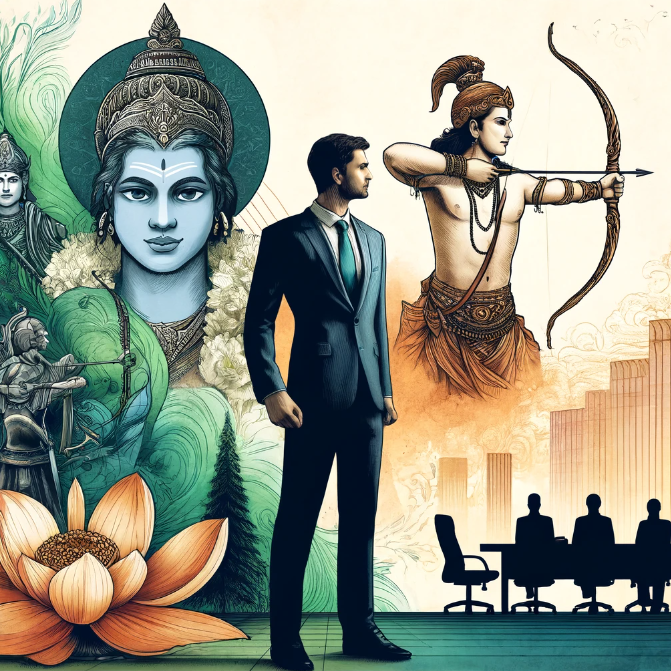The Mahabharata, a legendary Indian epic, is more than a tale of war and righteousness; it is a profound exploration of human emotions and relationships. Its characters and their journeys teach us valuable lessons about emotional intelligence the ability to understand and manage one’s emotions while building meaningful relationships. In today’s fast-paced world, where emotional intelligence is crucial for personal and professional success, the Mahabharata provides timeless insights that remain incredibly relevant.
Understanding Your Emotions
One of the most powerful lessons on emotional intelligence comes from Arjuna. On the battlefield, he experienced overwhelming doubt and fear, unable to act due to the emotional conflict within him. Krishna’s guidance helped him recognize and process these emotions, allowing him to focus on his duty. This reminds us of the importance of self-awareness, understanding and acknowledging our emotions is the first step toward managing them effectively. Practicing mindfulness and reflecting on our feelings can help us stay grounded in challenging situations.
Empathy and Understanding Others
Krishna’s empathy was a cornerstone of his leadership. He deeply understood the emotions and motivations of both the Pandavas and Kauravas, which allowed him to mediate conflicts and offer guidance that resonated with everyone. Empathy, the ability to see things from another’s perspective, is just as essential today. Whether it’s in personal relationships or professional collaborations, listening without judgment and seeking to understand others can foster trust and harmony.
Staying Calm Under Pressure
Yudhishthira, known for his calm demeanor, exemplified emotional regulation. Even during moments of extreme provocation, such as the infamous dice game, he managed to control his anger and focus on the bigger picture. Emotional regulation staying calm in stressful situations helps us make rational decisions and avoid impulsive actions. Simple practices like deep breathing and pausing before responding can go a long way in maintaining composure.
Resilience in the Face of Adversity
Draupadi’s story is one of resilience and strength. Despite facing humiliation and hardship, she channeled her emotions into a driving force for justice, inspiring the Pandavas to fight for their cause. Resilience is an essential part of emotional intelligence, helping us bounce back from setbacks and turn challenges into opportunities for growth. Building a strong support system and maintaining a positive mindset can enhance our ability to cope with adversity.
Resolving Conflicts with Empathy
The Mahabharata is filled with conflicts, but Krishna’s role as a mediator offers a masterclass in conflict resolution. His peace mission to Hastinapur showcased his ability to address grievances and offer solutions that appealed to all parties. Conflict resolution is about finding common ground and fostering understanding, a skill that is vital in today’s world. Open communication and a focus on mutual respect can help resolve differences effectively.
Overcoming Jealousy and Ego
Duryodhana’s jealousy and inflated ego led to his downfall, highlighting the destructive nature of unchecked emotions. In modern life, jealousy and ego can harm relationships and hinder personal growth. Cultivating gratitude and focusing on self-improvement can help us overcome these negative emotions and foster a sense of contentment and humility.
Building Strong Relationships
The relationships in the Mahabharata, particularly the bond between Draupadi and Krishna, emphasize the value of trust and loyalty. Strong interpersonal skills, including effective communication and active listening, are essential for building meaningful connections. In both personal and professional contexts, relationships built on mutual respect and understanding create a foundation for success.
Balancing Logic and Emotion
Krishna’s teachings in the Bhagavad Gita stress the importance of balancing emotions with logical reasoning. Arjuna’s journey from doubt to clarity illustrates how decisions made with both the heart and the mind lead to better outcomes. This balance is crucial today, where emotions can cloud judgment. Taking time to reflect and seek objective input can help us make more balanced decisions.
Letting Go of Unhealthy Attachments
Bhishma’s unwavering loyalty to his vows and his attachment to the throne, even when it conflicted with morality, led to unnecessary suffering. Emotional intelligence involves recognizing when to let go of attachments that no longer serve us. Prioritizing our values and well-being allows us to make choices that align with our goals and purpose.
Self-Motivation and Focus
The Pandavas remained motivated and focused on their goal of reclaiming their kingdom, despite years of exile and hardship. Self-motivation is a critical aspect of emotional intelligence, driving us to stay committed to our goals even when faced with challenges. Setting clear objectives and reminding ourselves of our purpose can keep us inspired.
Conclusion
The Mahabharata is a treasure trove of wisdom on emotional intelligence, offering lessons in self-awareness, empathy, resilience, and relationship building. These teachings are as relevant today as they were centuries ago, providing a roadmap for navigating emotions and relationships in a complex world.
By embracing these lessons, we can cultivate emotional intelligence to lead more meaningful, balanced, and impactful lives. The Mahabharata reminds us that true strength lies not just in physical power but in mastering our emotions and understanding others.






4 thoughts on “Emotional Intelligence Lessons from the Mahabharata: Timeless Wisdom for Modern Life”